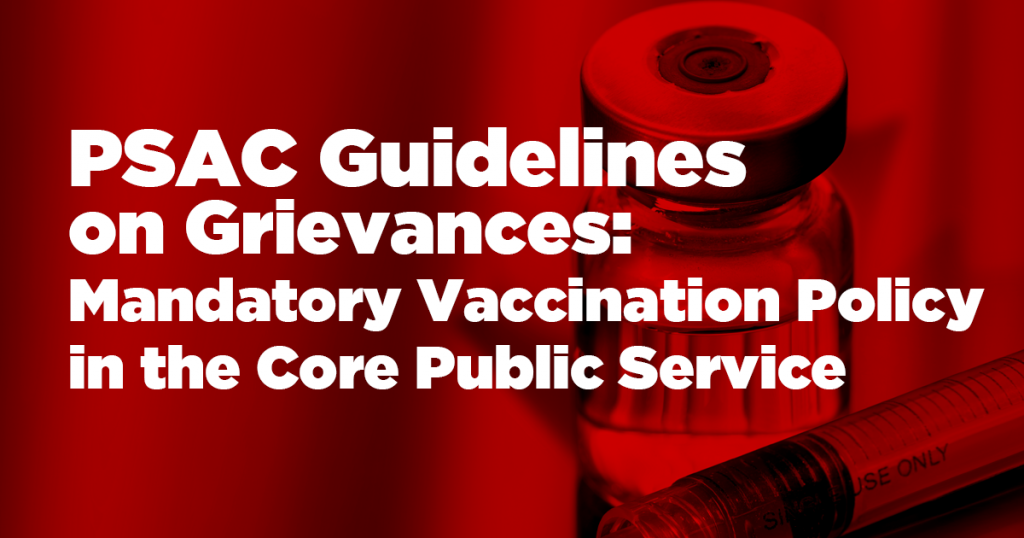
November 25, 2021
On October 6, 2021, the federal government released its mandatory vaccination policy. The policy applies to employees in the core public service. Since that time, PSAC has released an FAQ that is regularly updated.
The following information is to be read as a guideline only. It will be subject to change as the policy is implemented and the jurisprudence develops. The federal government’s mandatory vaccination policy states that it will be subject to review in six months.
Duty of fair representation
While PSAC has a duty of fair representation in light of its status as the exclusive bargaining agent, this does not equate to an absolute right to representation on every issue that members raise to challenge. For example, members who choose not to be vaccinated and have no legitimate human rights grounds to request an exemption are unlikely to succeed with grievances that challenge the legality of this new employer policy.
The duty of fair representation simply requires that the Union turn its mind to the issue raised by the member, review and analyse it and provide a rationale or explanation.
PSAC has clearly stated that it supports a vaccine mandate within specific parameters to protect the health and safety of all employees in the workplace. PSAC is not advising or counselling members without legitimate medical conditions or religious beliefs to find ways to avoid the policy. Doing so would also be contrary to our obligations as parties to policy health and safety committees mandated under Part II of the Canada Labour Code.
Grievances involving financial loss
The employer has stated that members were to be placed on leave without pay (LWOP) as early as November 15 if they were unvaccinated or had not submitted their vaccination status and had no legitimate human rights reason.
Grievances challenging the fact that a member has been placed on LWOP because they simply chose not to be vaccinated are very unlikely to succeed or to be referred to arbitration as there are arbitral decisions which have deemed LWOP to be a reasonable consequence of an employee’s refusal to follow a mandatory vaccination policy. The policy is likely to be seen as serving a legitimate purpose, reasonable and a good balance between the workplace concern (i.e., spreading COVID-19) and the intrusion on employee’s privacy.
Grievances involving a refusal of duty to accommodate on human rights-related grounds
PSAC is beginning to hear that some managers have stated that medical accommodations will not be allowed even though the policy clearly allows for medical accommodations and exemptions pursuant to the collective agreement and the Canadian Human Rights Act(CHRA) if the required documentation is provided and it is approved by management. Any blanket decisions not to accommodate members with legitimate human rights reasons should be challenged with a grievance alleging a failure of the duty to accommodate and discrimination on the basis of disability and possibly other intersecting grounds.
Grievances that deny members with sincere religious beliefs from obtaining an accommodation may be more difficult to detect. However, the policy supports exemptions on the basis of sincere religious belief with a sworn affidavit signed by a commissioner of oaths that attests that the person chooses not to be vaccinated due to their sincere religious beliefs.
As in all normal circumstances, a member requesting an accommodation must collaborate with the employer by providing supporting documentation.
Grievances that attempt to get around the policy
There is nothing in the policy that indicates that managers will be authorized to replace LWOP with sick leave, vacation leave, or personal leave if the intent is to circumvent the mandatory vaccination policy.
Falsifying or providing inaccurate information regarding the vaccination status may result in severe consequences and will likely lead to disciplinary actions from the employer.
As a result, it would be extremely difficult for PSAC to support grievances that attempt to circumvent or delay mandatory vaccination without any legitimate human rights reason.
Grievances involving personal belief or political conviction
A personal belief or political conviction is not a ground covered under collective agreements or the CHRA.
Grievances challenging the requirement for teleworkers to be vaccinated
The vaccine policy requires all federal public service workers in the core public administration to be vaccinated even if the majority are still teleworking. There is no exception for people who are teleworking unless the request to telework is a specific human rights accommodation following an individualized assessment.
Therefore, PSAC will not be supporting grievances by members who choose not to be vaccinated and use the fact that they always telework as a justification for their decision.
Policy grievances
No policy grievances will be filed on the basis of a failure to meaningfully consult with bargaining agents as the remedies are limited and are unlikely to be effective or meaningful for individual members. In the event there is a widespread privacy breach in the bargaining unit regarding the use, disclosure or storage of members’ personal medical information, PSAC will analyze the option of filing a policy grievance or a privacy complaint.
Source: PSAC Representation and Legal Services Branch